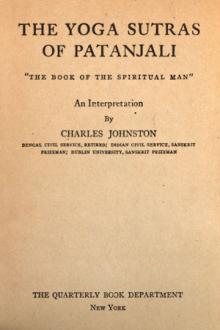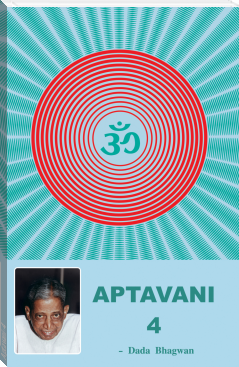The Yoga Sutras of Patanjali, Patañjali [most important books of all time TXT] 📗

- Author: Patañjali
- Performer: -
Book online «The Yoga Sutras of Patanjali, Patañjali [most important books of all time TXT] 📗». Author Patañjali
20. Nor could the Mind at the same time know itself and things external to it.
The truth is that the “mind” knows neither external things nor itself. Its measuring and analyzing, its hoping and fearing, hating and desiring, never give it a true measure of life, nor any sense of real values. Ceaselessly active, it never really attains to knowledge; or, if we admit its knowledge, it ever falls short of wisdom, which comes only through intuition, the vision of the Spiritual Man.
Life cannot be known by the “mind,” its secrets cannot be learned through the “mind.” The proof is, the ceaseless strife and contradiction of opinion among those who trust in the mind. Much less can the “mind” know itself, the more so, because it is pervaded by the illusion that it truly knows, truly is.
True knowledge of the “mind” comes, first, when the Spiritual Man, arising, stands detached, regarding the “mind” from above, with quiet eyes, and seeing it for the tangled web of psychic forces that it truly is. But the truth is divined long before it is clearly seen, and then begins the long battle of the “mind,” against the Real, the “mind” fighting doggedly, craftily, for its supremacy.
21. If the Mind be thought of as seen by another more inward Mind, then there would be an endless series of perceiving Minds, and a confusion of memories.
One of the expedients by which the “mind” seeks to deny and thwart the Soul, when it feels that it is beginning to be circumvented and seen through, is to assert that this seeing is the work of a part of itself, one part observing the other, and thus leaving no need nor place for the Spiritual Man.
To this strategy the argument is opposed by our philosopher, that this would be no true solution, but only a postponement of the solution. For we should have to find yet another part of the mind to view the first observing part, and then another to observe this, and so on, endlessly.
The true solution is, that the Spiritual Man looks down upon the psychic nature, and observes it; when he views the psychic pictures gallery, this is “memory,” which would be a hopeless, inextricable confusion, if we thought of one part of the “mind,” with its memories, viewing another part, with memories of its own.
The solution of the mystery lies not in the “mind” but beyond it, in the luminous life of the risen Lord, the Spiritual Man.
22. When the psychical nature takes on the form of the spiritual intelligence, by reflecting it, then the Self becomes conscious of its own spiritual intelligence.
We are considering a stage of spiritual life at which the psychical nature has been cleansed and purified. Formerly, it reflected in its plastic substance the images of the earthy; purified now, it reflects the image of the heavenly, giving the spiritual intelligence a visible form. The Self, beholding that visible form, in which its spiritual intelligence has, as it were, taken palpable shape, thereby reaches self-recognition, self-comprehension. The Self sees itself in this mirror, and thus becomes not only conscious, but self-conscious. This is, from one point of view, the purpose of the whole evolutionary process.
23. The psychic nature, taking on the colour of the Seer and of things seen, leads to the perception of all objects.
In the unregenerate man, the psychic nature is saturated with images of material things, of things seen, or heard, or tasted, or felt; and this web of dynamic images forms the ordinary material and driving power of life. The sensation of sweet things tasted clamours to be renewed, and drives the man into effort to obtain its renewal; so he adds image to image, each dynamic and importunate, piling up sin’s intolerable burden.
Then comes regeneration, and the washing away of sin, through the fiery, creative power of the Soul, which burns out the stains of the psychic vesture, purifying it as gold is refined in the furnace. The suffering of regeneration springs from this indispensable purifying.
Then the psychic vesture begins to take on the colour of the Soul, no longer stained, but suffused with golden light; and the man red generate gleams with the radiance of eternity. Thus the Spiritual Man puts on fair raiment; for of this cleansing it is said: Though your sins be as scarlet, they shall be white as snow; though they be as crimson, they shall be as wool.
24. The psychic nature, which has been printed with mind-images of innumerable material things, exists now for the Spiritual Man, building for him.
The “mind,” once the tyrant, is now the slave, recognized as outward, separate, not Self, a well-trained instrument of the Spiritual Man.
For it is not ordained for the Spiritual Man that, finding his high realm, he shall enter altogether there, and pass out of the vision of mankind. It is true that he dwells in heaven, but he also dwells on earth. He has angels and archangels, the hosts of the just made perfect, for his familiar friends, but he has at the same time found a new kinship with the prone children of men, who stumble and sin in the dark. Finding sinlessness, he finds also that the world’s sin and shame are his, not to share, but to atone; finding kinship with angels, he likewise finds his part in the toil of angels, the toil for the redemption of the world.
For this work, he, who now stands in the heavenly realm, needs his instrument on earth; and this instrument he finds, ready to his hand, and fitted and perfected by the very struggles he has waged against it, in the personality, the “mind,” of the personal man. This once tyrant is now his servant and perfect ambassador, bearing witness, before men, of heavenly things and even in this present world doing the will and working the works of the Father.
25. For him who discerns between the Mind and the Spiritual Man, there comes perfect fruition of the longing after the real being of the Self.
How many times in the long struggle have the Soul’s aspirations seemed but a hopeless, impossible dream, a madman’s counsel of perfection. Yet every finest, most impossible aspiration shall be realized, and ten times more than realized, once the long, arduous fight against the “mind,” and the mind’s worldview is won. And then it will be seen that unfaith and despair were but weapons of the “mind,” to daunt the Soul, and put off the day when the neck of the “mind” shall be put under the foot of the Soul.
Have you aspired, well-nigh hopeless, after immortality? You shall be paid by entering the immortality of God.
Have you aspired, in misery and pain, after consoling, healing love? You shall be made a dispenser of the divine love of God Himself to weary souls.
Have you sought ardently, in your day of feebleness, after power? You shall wield power immortal, infinite, with God working the works of God.
Have you, in lonely darkness, longed for companionship and consolation? You shall have angels and archangels for your friends, and all the immortal hosts of the Dawn.
These are the fruits of victory. Therefore overcome. These are the prizes of regeneration. Therefore die to self, that you may rise again to God.
26. Thereafter, the whole personal being bends toward illumination, toward Eternal Life.
This is part of the secret of the Soul, that salvation means, not merely that a soul shall be cleansed and raised to heaven, but that the whole realm of the natural powers shall be redeemed, building up, even in this present world, the kingly figure of the Spiritual Man.
The traditions of the ages are full of his footsteps; majestic, uncomprehended shadows, myths, demi-gods, fill the memories of all the nobler peoples. But the time cometh, when he shall be known, no longer demi-god, nor myth, nor shadow, but the ever-present Redeemer, working amid men for the life and cleansing of all souls.
27. In the internals of the batik, other thoughts will arise, through the impressions of the dynamic mind-images.
The battle is long and arduous. Let there be no mistake as to that. Go not forth to this battle without counting the cost. Ages have gone to the strengthening of the foe. Ages of conflict must be spent, ere the foe, wholly conquered, becomes the servant, the Soul’s minister to mankind.
And from these long past ages, in hours when the contest flags, will come new foes, mind-born children springing up to fight for mind, reinforcements coming from forgotten years, forgotten lives. For once this conflict is begun, it can be ended only by sweeping victory, and unconditional, unreserved surrender of the vanquished.
28. These are to be overcome as it was taught that hindrances should be overcome.
These new enemies and fears are to be overcome by ceaselessly renewing the fight, by a steadfast, dogged persistence, whether in victory or defeat, which shall put the stubbornness of the rocks to shame. For the Soul is older than all things, and invincible; it is of the very nature of the Soul to be unconquerable.
Therefore fight on, undaunted; knowing that the spiritual will, once awakened, shall, through the effort of the contest, come to its full strength; that ground gained can be held permanently; that great as is the dead-weight of the adversary, it is yet measurable, while the Warrior who fights for you, for whom you fight, is, in might, immeasurable, invincible, everlasting.
29. He who, after he has attained, is wholly free from self, reaches the essence of all that can be known, gathered together like a cloud. This is the true spiritual consciousness.
It has been said that, at the beginning of the way, we must kill out ambition, the great curse, the giant weed which grows as strongly in the heart of the devoted disciple as in the man of desire. The remedy is sacrifice of self, obedience, humility; that purity of heart which gives the vision of God. Thereafter, he who has attained is wrapt about with the essence of all that can be known, as with a cloud; he has that perfect illumination which is the true spiritual consciousness. Through obedience to the will of God, he comes into oneness of being with God; he is initiated into God’s view of the universe, seeing all life as God sees it.
30. Thereon comes surcease from sorrow and the burden of toil.
Such a one, it is said, is free from the bond of Karma, from the burden of toil, from that debt to works which comes from works done in self-love and desire. Free from self-will, he is free from sorrow, too, for sorrow comes from the fight of self-will against the divine will, through the correcting stress of the divine will, which seeks to counteract the evil wrought by disobedience. When the conflict with the divine will ceases, then sorrow ceases, and he who has grown into obedience, thereby enters into joy.
31. When all veils are rent, all stains washed away, his knowledge becomes infinite; little remains for him to know.
The first veil is the delusion that thy soul is in some permanent way separate from the great Soul, the divine Eternal. When that veil is rent, thou shalt discern thy oneness with everlasting Life. The second veil is the delusion of enduring separateness from thy other selves, whereas in truth the soul that is in them is one with the soul that is in thee. The world’s sin and shame are thy sin and shame: its joy also.
These veils rent, thou shalt enter into knowledge of divine things





Comments (0)